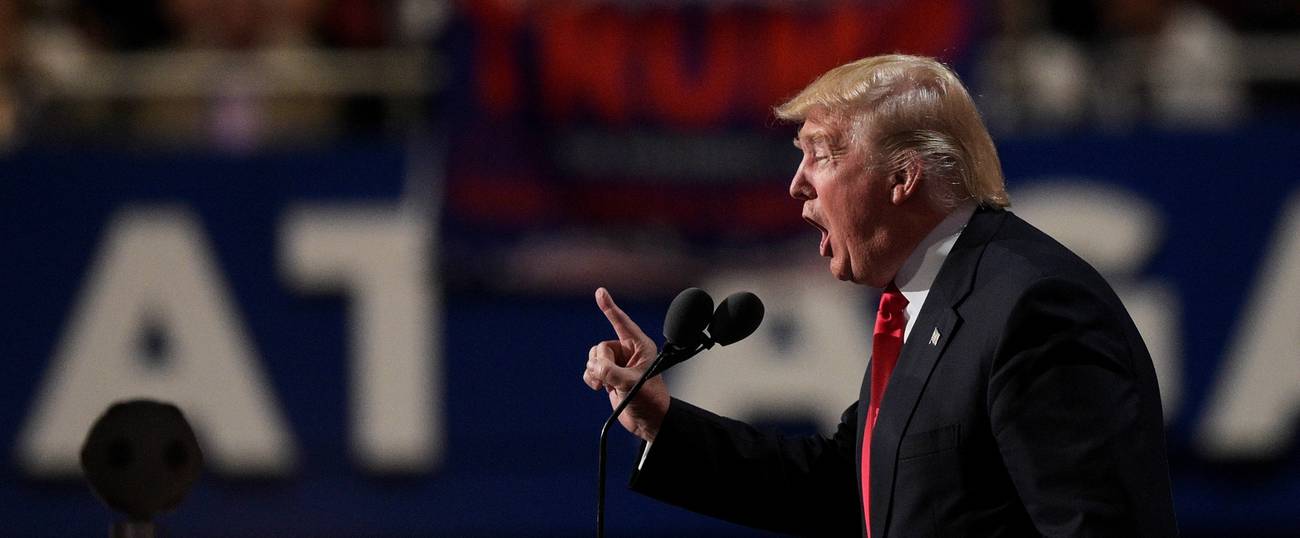Trump Tells Americans They Have Much To Fear Beyond Fear Itself
In painting America as barren and embattled, Trump broke from conservative orthodoxy—and reality—while flashing glimmers of greater political prowess




At a Republican primary debate in January, when his candidacy was still considered something between a fluke and a joke, Donald Trump proclaimed, “I will gladly accept the mantle of anger.” On Thursday night, in accepting the Republican party’s presidential nomination, he became the very avatar of that anger.
In a fiery speech devoid of humor and hope, the mogul turned reality star turned politician outlined a grim American landscape that would have been unrecognizable to previous GOP presidents like Ronald Reagan and George W. Bush. In place of their sunny conservatism and can-do optimism, Trump offered resignation, condemnation, and shadowy conspiracism.
He spoke of a broken, corrupt country which keeps its people down. “Nobody knows the system better than me, which is why I alone can fix it,” he declared. “I have seen firsthand how the system is rigged against our citizens.”
He condemned America’s free trade deals for harming its workers and economy (when studies show they’ve done the opposite), and decried skyrocketing crime rates (when statistics show they have actually fallen). Illegal immigrants were cast not simply as a threat to American jobs, but to American lives. Not only America’s adversaries but its allies were harshly criticized—the former as rivals, the latter as freeloaders.
By the time it was over, Trump’s acceptance speech clocked in as the longest in modern history at 76 minutes.
76 minutes, hugest acceptance speech in modern political history. Via @CarrieNBCNews pic.twitter.com/nqMUbnsUiZ
— Benjy Sarlin (@BenjySarlin) July 22, 2016
This speech should be called “Midnight in America” because it’s depressing as hell and that’s when it’s going to end.
— Binyamin Appelbaum (@BCAppelbaum) July 22, 2016
By speaking from a teleprompter, Trump was able to project greater gravitas and seriousness, at the cost of his usual spontaneity and entertaining asides. Shorn of any explicit bigotry but filled with exaggerations and half-truths, the address more closely resembled his carefully scripted AIPAC address than his off-the-cuff campaign stop riffs. Trump even played the statesman at several junctures, shutting down his supporters’ anti-Hillary chant of “lock her up”—a popular standby throughout the convention—by countering with “let’s defeat her in November.” Then, in thanking his evangelical backers for their support, Trump also ad-libbed an acknowledgement about how “I’m not sure I totally deserve it”—a rare expression of humility that was not in the prepared text.
In these more disciplined moments, Trump’s speech hinted at the makings of a formidable presidential candidacy. In its overbearing length, narrow worldview, and hectoring tone, however, the address also reflected Trump’s longstanding weaknesses. Whether Trump will be able to run a competitive race against Hillary Clinton will come down, in part, to which of these sides finds greater expression.
Yair Rosenberg is a senior writer at Tablet. Subscribe to his newsletter, listen to his music, and follow him on Twitter and Facebook.